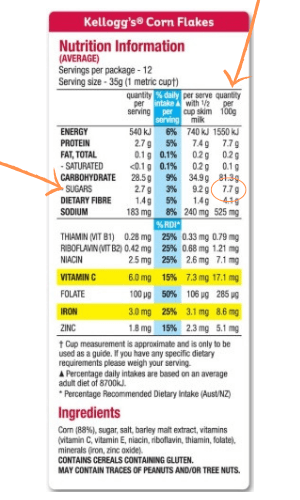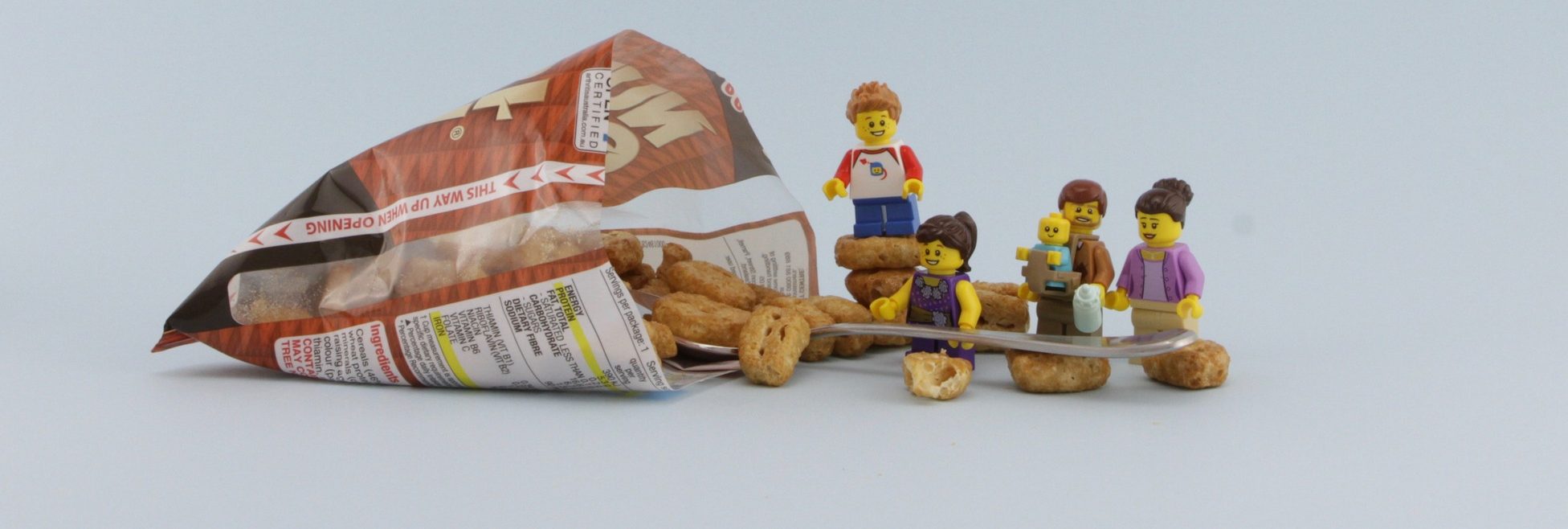The best and worst breakfast cereals for teeth
Finding the highest sugar breakfast cereals is an easy job because it’s most of them!
This article will help you to filter through the worst options to find the best, healthy cereals and options to keep your child healthy.
How to Find Sugar Content in Nutritional Labels
To compare different foods, go to the ‘per 100g’ column and scroll down to ‘sugars’ to find the amount of sugar per 100g of that food.

How much sugar is ok?
The figures below are the guidelines we use to categorise foods into low sugar (everyday foods), moderate sugar (sometimes foods) and high sugar (special occasion foods). Keep in mind that the World Health Organisation Guidelines recommend a MAXIMUM of 6 teaspoons of free sugars per day for 2-12 year olds, with the aim being 3 or less.
Dried fruit found in many breakfast cereal is included as free sugar.
To calculate the number of teaspoons of sugar in food, divide the grams of sugar by 4.
Teaspoons = grams/4
These figures are just a guide and you should take serving sizes into consideration when making decisions. It’s a good exercise for parents and carers of any child who is at risk of decay to do a stocktake of pantry items and food intake over a typical week to make sure sugar consumption doesn’t go above the WHO guidelines.
| Sugar (g) per 100g | Equivalent Teaspoons of Sugar | |
| LOW SUGAR (everyday foods) |
<5 grams |
1.25 |
| MODERATE SUGAR (sometimes foods) |
5.1-14.9 grams |
1.3-3.7 |
| HIGH SUGAR (special occasions) |
15 grams + |
3.8 + |
High Sugar Cereals
Sadly, the following list includes the majority of cereals available in Australia. Most are well above the 5g sugar per 100g that would make them good choices for everyday food. These cereals are a very poor start to the day and should be considered special occasion foods.
Frosties tip the scales at a whopping 41g of sugar (10 teaspoons) per 100g. This is about the same amount of sugar in Jelly Snakes lollies, Oreos and many other foods you would never consider giving your child for breakfast.
| Cereal | Sugar (g) per 100g | Teaspoons of Sugar |
| Frosties | 41.3 | 10 |
| Froot Loops | 38 | 9.5 |
| Coco Pops | 36.5 | 9.1 |
| Crunchy Nut Cornflakes | 31 | 7.8 |
| Sultana Bran | 28.2 | 7.1 |
| Milo cereal | 26.9 | 6.7 |
| Nutri Grain | 26.7 | 6.6 |
| Just Right | 22.9 | 5.7 |
| Sustain | 19.4 | 4.9 |
| Carman’s Gourmet Porridge Sachets (Apple Sultana Cinnamon) | 19 | 4.8 |
| Weet-bix Go Biscuits | 17.1 | 4.3 |
| Carman’s Muesli Classic Fruit and Nut | 15 | 3.8 |
Moderate Sugar – Sometimes Foods
These are ok sometimes – think once a month or less but definitely not every day! The sugar content at the upper end of this category is still pretty high in regards to dental health, but could be considered in moderation as part of an otherwise low sugar diet. Cheerios are just scraping in to this category, but are a poorer option than the mueslis due to being otherwise devoid of nutrition.
| Cereal | Sugar (g) per 100g | Teaspoons of Sugar |
| Cheerios | 14.6 | 3.7 |
| Morning Sun Natural Muesli | 14.1 | 3.5 |
| Special K | 13.6 | 3.4 |
| Woolworths Reduced Sugar Multigrain Cereal | 10.5 | 2.6 |
| Carmen’s Gourmet Porridge Sachets (Golden Maple) | 10.4 | 2.6 |
| Woolworths Classic Fruit and Nut Muesli | 9.5 | 2.4 |
| Rice Bubbles | 8.7 | 2.2 |
| Carman’s Fruit-Free Muesli | 8 | 2 |
| Cornflakes | 7 | 1.8 |
Low Sugar: OK for everyday
| Cereal | Sugar (g) per 100g | Teaspoons of Sugar |
| Weet-bix | 3.3 | 0.8 |
| Weet-bix for Kids (no salt) | 2.9 | 0.7 |
| Carman’s Porridge Sachet 5 Grain Super Seed | 1.4 | 0.4 |
| Carman’s Porridge Sachet Almond, Pecan Hazelnut | 1.2 | 0.3 |
| Uncle Toby’s Oat Brits | 0.8 | 0.2 |
| Vita-brits | 0.4 | 0.1 |
A Note on Refined Complex Carbohydrates
This is a complex topic and there are several factors involved in how much potential these foods have in causing decay. Typically, the Western diet is high in carbohydrates, and it is the combination of consuming refined complex carbohydrates AND simple sugars in our diet that is believed to increase decay risk.
As well as removing simple sugars, any reduction in the amount of processed, refined carbohydrates in your child’s diet will have several health benefits in the long-term as well as reducing their decay risk.
Refined complex carbohydrates include foods such as breakfast cereals, white bread, crackers, pasta and any other foods made from wheat flour (pastry, pizza dough, batters), white rice, potato and any grain that has been turned into ‘flakes’, ‘puffs’, ‘shreds’, ‘cakes’, ‘biscuits’ or chips.
Refined complex carbohydrates take a long time to clear from the mouth. Have you ever noticed how long a Sao biscuit or Weet-bix sits in the grooves of molars before it is all swallowed? Because this type of carbohydrate is already so processed, it turns into sugar on the tooth surface very quickly.
Refined complex carbohydrates end up having the same effect as a high sugar food. When eaten frequently, or in combination with other simple sugars, the risk of decay increases significantly.
Children need carbohydrates for energy, but you should try to have them come from unrefined sources. Choose smart carbs that will give sustained energy release such as wholegrains, vegetables, fruit, beans, lentils and legumes that all provide sources of unrefined complex carbohydrates that are great for both teeth and general health.
THE BEST BREAKFAST CHOICES
The best breakfast choices are those that are minimally processed and contain vitamins and minerals as part of the whole food, rather than being added to processed food.
- Eggs on wholemeal toast
- Plain porridge/oats with fresh fruit (berries are the lowest in sugar)
- Peanut butter, nut and sunflower butters or savoury spreads on wholemeal toast
Try to think outside the square of sweet breakfasts and include some veggies into the meal. It does take some time to change the mindset of having more savoury foods at breakfast, but there are some tasty options.
Frittatas are a great way to do this (even if it’s just the weekend meals) and it will give your child a break from the more processed (but convenient) options that may be a necessity to get through the school week.
